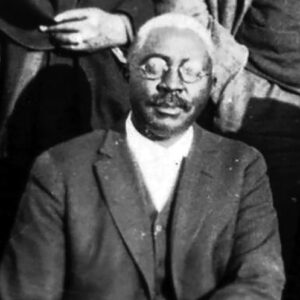calsfoundation@cals.org
Ottawa (O. W.) Gurley (1868–1935)
Raised in Arkansas, Ottawa (O. W.) Gurley, whose first name appears in some sources as Ottaway, became one of the most prominent Black homesteaders and businessmen in Tulsa, Oklahoma, before leaving that state after the Tulsa Race Riot (also called the Tulsa Race Massacre) of 1921.
Ottawa Gurley was born on December 25, 1868, in Huntsville, Alabama, to John and Rosanna Gurley. His siblings included Calvin, General, John, Millie, and Pat. The family arrived in Arkansas around 1876. The 1880 U. S. Census shows the family living in Vaugine Township, Jefferson County, Arkansas. During this period, Branch Normal College (now the University of Arkansas at Pine Bluff) began to educate students. Gurley completed courses in 1884 and was a student of Joseph Carter Corbin, a prominent educator in Arkansas.
Ottawa Gurley and Emma Evans married on January 25, 1888. The Arkansas Gazette mentions his attendance at the State Baptist Sunday School Convention at the “colored Baptist Church” in August of the same year. The U.S. register of Civil, Military and Naval Service, 1863–1959, lists him as a letter carrier in July 1891. Emma and Ottawa were living in Perry, Noble County, Oklahoma, by 1900. They were among the homesteaders seeking freedom, opportunity, and wealth in the Great Oklahoma Land Rush. Gurley ran for county treasurer and was principal of the town’s school.
After a decade in Perry, the family sold their store and land and moved to Tulsa. They bought a tract on the north side of the Frisco train tracks. The couple was in Tulsa Ward 1 in 1910. The U.S. Census lists no occupation for Ottawa. Emma is listed as the “lunch lady” of a rooming home. By 1920, Emma was managing a hotel, and Ottawa was a real estate broker in a part of Tulsa known as Greenwood—commonly known as “Black Wall Street” for the concentration of Black-run businesses there. Hannibal B. Johnson, a Tulsa-based historian, wrote, “Greenwood, named for a town in Mississippi, would be perceived as a place to escape oppression—economic, social, political oppression—in the Deep South.”
A 2020 Forbes magazine retrospective of Greenwood’s destruction during the Tulsa Race Massacre described Gurley as the “Bezos of Black Wall Street.” Among his businesses were a grocery store and an employment agency, along with his hotel and real estate empire. He also started a Masonic lodge and was eventually made a sheriff’s deputy.
During the destruction of Greenwood during the Tulsa Race Riot, Ottawa and Emma Gurley were detained in a National Guard internment camp. The couple soon left for Los Angeles, California. He was listed there as a registered Republican as early as 1924. Ten years later, his party affiliation was Democrat.
Gurley died on August 6, 1935, and is buried in Evergreen Cemetery in Los Angeles.
For additional information:
“1921 Tulsa Race Massacre.” Tulsa Historical Society and Museum. https://www.tulsahistory.org/exhibit/1921-tulsa-race-massacre/ (accessed June 4, 2021).
“The Arkansas Baptist.” Arkansas Gazette, August 23, 1888, p. 1.
Gara, Antoine. “The Bezos of Black Wall Street.” Forbes, June 18, 2020. https://www.forbes.com/sites/antoinegara/2020/06/18/the-bezos-of-black-wall-street-tulsa-race-riots-1921/?sh=7befb830f321 (accessed June 3, 2021).
“Ottaway W. ‘O. W.’ Gurley.” Find-a-Grave.com. https://www.findagrave.com/memorial/211775762/ottoway_w-gurley (accessed June 3, 2021).
Rhonda Stewart
Central Arkansas Library System
 Business, Commerce, and Industry
Business, Commerce, and Industry Early Twentieth Century, 1901 through 1940
Early Twentieth Century, 1901 through 1940 Ottawa (O. W.) Gurley
Ottawa (O. W.) Gurley 




Comments
No comments on this entry yet.